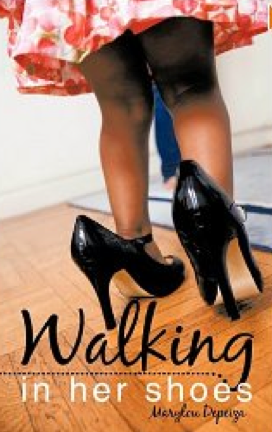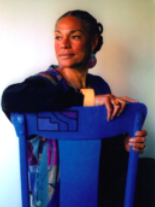When the Friends of the South End Library (FOSEL) began to sponsor authors at the South End Library to read from their work three years ago, we had no idea how popular the adventure would become, or whether anyone would show up. What we did know was that the South End branch had an incredibly supportive and interested staff who would help us, that the South End is, was, and likely will always be a haven for writers, artists, musicians and other creative minds, and that we had a wonderful graphic designer on our board, Mary Owens, who would generously and cleverly volunteer to do the posters we needed to announce the readings.
It's easy to take for granted all the different roles a free public library plays in the community it serves, from the vaulted place of research to the simple refuge that is cool in the summer, warm in the winter, with a free, clean bathroom in a culture where that sort of basic amenity can be hard to find.
What FOSEL was not fully cognizant of at the time is that a library is also a place where local residents can find out who else actually lives here, who is writing what, who is thinking what, and what our local history is. This is what The South End Writes has become: a mirror of literary achievement by the many fine writers, journalists and poets who live where we live, shop where we shop, take the T and go to the polls just like we do. We just didn't know who they were, but increasingly we do. Writers are invited by FOSEL board members, by FOSEL supporters and literary luminaries like Sue Miller and Doug Bauer, and by the South End Library staff, headed by Anne Smart. The ones who have enriched us with their work include Sue Miller, Doug Bauer, Chris Kimball, Joanne Chang, John Sacco, Phil Gambone, Johnny Diaz, Susan Naimark,, Henri Cole, Sara Lawrence Lightfoot, Stephen Davis, Margot Livesey, Alice Stone, Mari Passananti, Maryanne O'Hara, L. Annette Binder, Edith Pearlman, Christine Chamberlain, Sven Birkerts, Wendy Wunder, Lily King, Susan Conley, Alison Barnet and Scott Pomfret, among others.
Coming up between now and the summer are:Leah Hager Cohen, Lynne Potts, April Bernard, Andre Dubus III, Mari Passananti, Doug Bauer, Dennis Lehane, Alice Hoffman, Alice Stone, and Phil Gambone. Some will read at the South End branch for the first time; others are returning to update us on new work, or work in progress.
Perhaps the best compliment paid to The South End Writes is that another library Friends group, at the Jamaica Plain branch, has begun its own series, Jamaica Plain Writes, with the first author, JP resident Chuck Collins, appearing there on Thursday, January 24, at 6:45 p.m. Collins is an expert on U.S. inequality, the author of several books, and a senior scholar at the Institute for Policy Studies, a progressive think tank. For further information about the JP Writes series, check the link to their web site here.
Below is the list of writers scheduled to appear at the South End Library until July. Occasionally, schedules need to change, but FOSEL posts them on this web site as soon as they become known.
Wishing you a Happy and Writerly New Year....
UPCOMING READINGS FOR THE SOUTH END WRITES ARE:
January 15, 2013, 6:30 p.m.
Leah Hager Cohen
The Grief of Others
The author, who publishes both fiction and non-fiction, will read from her latest novel which the New York Times described as “her best work yet.” With an introduction by Sue Miller
Tuesday, January 29, 6:30 p.m.
Lynne Potts
A Block in Time: a History of Boston’s South End from a Window on Holyoke Street. The author, who moved into a house on Holyoke Street with two young children in 1978, has written a personal history that includes what it was like to be young in the 60s, the turmoil and transformations of the South End from the time it was created out of Boston Bay, and captivating details of the characters in her neighborhood. A poet as well as a writer, she splits her time living on Rutland Street and in New York City, where she was Poetry Editor of the Columbia Journal of Literature and Art.
Tuesday, February 5, 6:30 p.m.
April Bernard
The poet (Romanticism)and novelist, most recently of history (Miss Fuller), is currently the director of creative writing at Skidmore College. With an introduction by South End author Doug Bauer, whose own new collection of essays, "What Happens Next?" will come out this fall.
Tuesday, February 26, 6:30 p.m.
Andre Dubus III
Townie, a Memoir
The examination of the author’s violent past has been described ”best book” of non-fiction of 2011 and 2012 by many literary-gate guardians, and was preceded by his previous novelsHouse of Sand and Fog (made into a movie by the same name) and The Garden of Last Days. Sue Miller will introduce the author.
Tuesday, March 19, 6:30 p.m.
Mari Passananti
will read from her second novel, The K Street Affair.
Tuesday, April 16, 6:30 p.m.
Doug Bauer
Editor, writer of numerous books of fiction and non-fiction, and revered professor of English at Bennington College (to where he commutes from the South End), Bauer will read from his most recent collection of essays, What Happens Next?, to be published in the fall of 2013 by the University of Iowa Press.
Tuesday, May 14, 6:30 p.m.
Dennis Lehane, the spectacularly successful author who grew up in Dorchester and is ALSO a BPL trustee, published his latest novel, Live by Night, in 2012. Set in Boston in the 1920s, the New York Times’ reviewer called the book a “sentence-by-sentence pleasure.”
Tuesday, May 21, 6:30 p.m.
Alice Hoffman
The Dovekeepers, a historical novel describing the AD70 massacre at Masada from the point of view of four women at the fortress before it fell during the Jewish-Roman war, is the most recent of the nearly two dozen novels by Hoffman and just came out in paperback. To be introduced by Sue Miller.
Tuesday, June 11, 6:30 p.m.
Alice Stone,
the local filmmaker whose mesmerizing documentary, Angelo Unwritten, has followed the life of a teenager adopted out of foster care when he was twelve, will return with an update of new material gathered since December 2011.
Tuesday, June 18, 6:30 p.m.
Philip Gambone
will return to read from his current work-in-progress, retracing the steps of his father who, as a soldier, was sent to Europe during the Second World War.
The five favorite books recommended by the authors mentioned above, and previous speakers, can be found under THE SOUTH END READS.





























